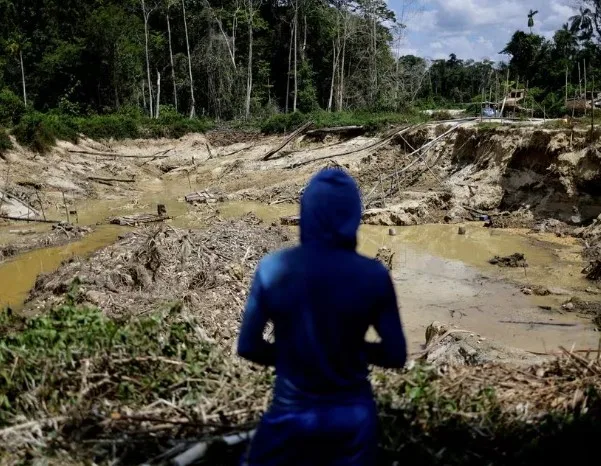Brazil sends troops into the Amazon to protect borders and fight drug traffickers and illegal mining
By Anthony Boadle and Ricardo Brito
Border tensions over Guyana’s Esequibo and the humanitarian crisis among the Yanomami Indigenous people have led Brazil’s army to increase its forces in the Amazon by 10% ahead of plan, the military commander for the region told Reuters.

An illegal miner looks at a destroyed forest area, while being detained by a members of the Special Inspection Group from the Brazilian Institute of Environment and Renewable Natural Resources (IBAMA) during an operation against illegal mining in Yanomami Indigenous land, Roraima state, Brazil.
The additional 2,000 troops will help the army patrol a 9,000 km border with Venezuela, Colombia, Ecuador, Peru and Bolivia in a jungle region used by drug traffickers and illegal miners, loggers and smugglers, General Ricardo Costa Neves said.
“They will reinforce our operations in this vast area to help combat border and environmental crimes,” the four-star infantry general said in a rare media interview.
The dispute arising from Venezuela’s claim over Guyana’s oil-rich Esequibo region has already led the Brazilian army to send more soldiers, armored cars and artillery to the border state of Roraima with the creation of a new regiment there.
“The border situation made us bring forward some changes that were in our strategic plan. We are practically tripling our mechanized infantry, armored vehicles and artillery in Roraima,” Costa Neves said.
The reinforcement will include the creation of two permanently deployed forward bases inside the Yanomami reservation on the Uraricoera and Mucajai rivers, major access routes for wildcat gold miners that have invaded the territory.
The miners brought disease, destruction of the rainforest and armed violence to the isolated Yanomami lands bordering Venezuela, causing malnutrition and deaths. Brazil’s government last year declared a humanitarian emergency and sent a task force to remove an estimated 20,000 miners.
But gold miners began to return after the armed forces scaled back their operations and failed to enforce a no-fly zone for planes flying them to clandestine jungle airstrips, environmental enforcement agents told Reuters.
Costa Neves said the army will have a permanent presence at two new bases providing logistical support to environmental, Indigenous and health agencies, beside repressing illegal activities within a 150-kms zone from the border.
The general, who commanded the U.N. peacekeeping mission in the Democratic Republic of Congo (Monusco) in 2020-2021, rejected criticism of the military’s failure to secure the Yanomami territory last year.
“We airlifted 600 tons of food and supplies that were dropped by parachute to Indigenous communities. It was the largest airlift operation in the Brazilian Air Force’s history,” he said.
With the support of the military, 80% of the miners were evicted, some 80 dredging barges were blown up and 22 planes seized or destroyed, Costa Neves said.
The armed forces on their own distributed 36,000 food parcels, medivacked 206 patients out of 6,000 Yanomami attended and arrested 165 suspects for environmental crimes, he said.
___________________
Credit: Reuters




















